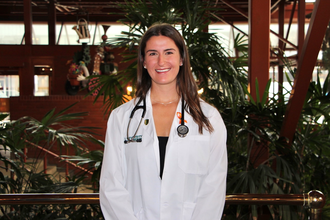A Deeper Understanding of The Mental Health Impacts of Polycystic Ovary Syndrome (PCOS)

There are many medical conditions that hold a social stigma which prevent them from being openly discussed and understood. One such condition affects millions of women worldwide, yet despite the startling numbers, awareness and understanding of it is unusually low. This condition is Polycystic Ovary Syndrome, more commonly known as PCOS.
As part of PCOS Awareness Month, which runs the month of September, we took the time to learn more and raise awareness of this often-misunderstood syndrome. We were fortunate enough to speak with Sophie Lalonde-Bester, an AWHF-supported student researcher with Dr. Donna Vine at the Women and Children’s Health Research Institute (WCHRI) who conducted a recent study on PCOS and its relationship to mental health. She took the time to share the results of her PCOS Together team’s research and provided a better understanding of what PCOS entails.
What is PCOS?
PCOS is a condition that affects hormone levels in females across their entire lifespan. PCOS is a chronic condition, with no known cure. The syndrome comes with a litany of side effects, most commonly irregular periods, excess hair growth, and acne, but can also lead to severe side effects such as infertility. In addition, people with PCOS are at greater risk of both type 2 diabetes and heart disease.
The Alarming Statistics
PCOS is more than just a diagnosis, it is intertwined with various mental health challenges and social perceptions. Sophie highlighted that individuals with PCOS are three to six times more likely to develop eating disorders compared to those without the condition. On top of that, a staggering two-thirds of individuals with PCOS report experiencing anxiety and depression. These statistics serve as critical indicators that PCOS is more than just a reproductive issue, but a complex condition that affects an individual’s overall well-being.
Breaking The Stigma
In speaking with Sophie, a large focus within her group’s research is PCOS’s relation to mental health, and specifically eating disorders. This focus was largely due to the very common misconception around the condition, being that PCOS only affects people living in larger bodies.
“PCOS affects people of all body types, shapes, and sizes. The existing stereotype can really lead to delayed diagnosis or misdiagnosis of people who don't fit the wrongly assumed profile.” – Sophie Lalonde-Bester, RD, MD Candidate, University of Alberta
Historically, there has been a prescription of weight loss as a first line treatment for PCOS to alleviate symptoms. There is more to it than this, however. As Sophie described in her research, and in research occurring around the world, evidence supports the idea that a focus on weight in treating PCOS can be more harmful for an individual, due to how common eating disorders are in those suffering from PCOS. The focus on weight loss as a solution can instead lead to issues that exacerbate eating disorders, like additional stress and weight cycling, issues already being faced when dealing with PCOS.
Managing PCOS
So, if there is no known cure for PCOS, and the commonly known treatments are ones built on a stigma that can perpetuate harm, how does one with the condition counter the side effects and move forward in life?
“The focus should be on promoting sustainable habits that can help enhance health and quality of life.” – Sophie Lalonde-Bester, RD, MD Candidate, University of Alberta
There are several steps that can be taken to help manage PCOS, whether for daily living or assisting in fertility. As Sophie noted, a sustainable balance of nutritious foods and activity can support balanced insulin levels which can help alleviate some symptoms. Additionally, medications can also help balance hormones, leading to better regulation of menstrual cycles, reducing side effects like hair growth, and helping in ovulation.
The Future of Research
There is still a lot to learn about PCOS and how it impacts those living with it. More research can lead to better treatment and a deeper understanding of how PCOS affects different individuals.
As research around the world continues, Sophie and her team within the PCOS Together laboratory are delving into learning more and recruiting participants for further studies, further examining the prevalence of eating disorders among individuals with and without PCOS. If you or someone you know is interested in participating, you are encouraged to reach out to the PCOS Together laboratory at the University of Alberta for more information using the links to the study here.
How You Can Support Those With PCOS
- Educate Yourself and Others: Understanding the signs and symptoms of PCOS can lead to earlier diagnosis and better management of the condition.
- Share Your Story: If you have PCOS, sharing your experiences can help normalize the conversation and reduce stigma.
- Participate in Research: Engage in studies to help enhance knowledge and treatment options for future generations.
- Advocate for Awareness: Use your platform. Whether its social media, community groups, or just with family, discussing PCOS can help promote better understanding.
PCOS Awareness Month serves as an important reminder of the need for ongoing education and advocacy for this condition. With alarming statistics that highlight the mental health challenges faced by those with PCOS, it is essential to break the stigma and foster a supportive community. As PCOS Awareness Month comes to an end, support for the condition doesn’t have to.
Together, we can create a future where individuals with PCOS are seen, heard, and supported.